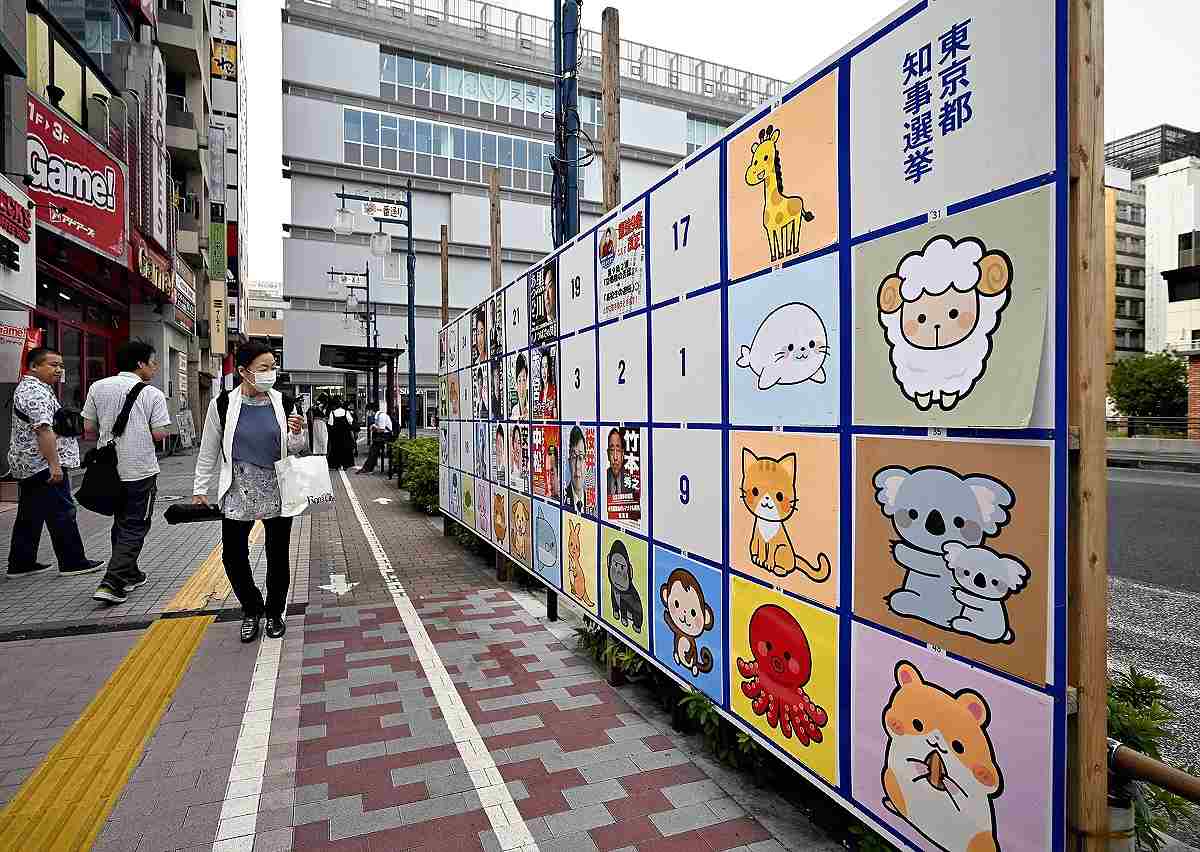Parties Aim to Revise Election Law This Autumn; Unseemly Candidate Behavior has Raised Concern

Posters showing animal illustrations are seen on an election billboard for the Tokyo gubernatorial election in Katsushika Ward, Tokyo, in late June.
15:03 JST, July 20, 2024
The Liberal Democratic Party and the Constitutional Democratic Party of Japan agreed on Friday to work to revise the Public Offices Election Law at the upcoming extraordinary Diet session this autumn, after several issues have arisen over the way some candidates have conducted campaigns.
In one such issue, many posters unrelated to candidates were put up on dedicated campaign billboards during the official campaign period for the July 7 Tokyo gubernatorial election, because a political organization effectively sold the billboard spaces for its candidates by transferring the right to put up posters there to those who donated to the group.
Moreover, when broadcasting campaign videos, there have also been multiple cases of undignified behavior by some candidates for recent elections.
Friday’s agreement was made during a meeting between the Diet affairs committee chairpersons from the ruling and main opposition parties.
Separately, Prime Minister Fumio Kishida, also the LDP president, also had a meeting with Natsuo Yamaguchi, leader of the LDP’s junior coalition partner Komeito, in which they agreed to aim for revision of the election law by adjusting their respective stances on related issues.
“We will work together with an eye on setting the stage [for the revision] before the upcoming LDP presidential election [in late September],” Yamaguchi said to reporters following the meeting.
Earlier on Friday, working-level officials from the two parties held their first discussions on revising the law. They agreed that for the amendment, they would focus on issues regarding posters and broadcasts of candidates’ campaign videos.
Meanwhile, some acts of obstructing street speeches were particularly noticeable during a recent lower house by-election in Tokyo. However, the working-level officials agreed that such incidents can be handled under the current Public Offices Election Law because it already has stipulations for charges of obstructing the freedom of elections.
Within the LDP, there are already some specific ideas on the table for the revision. Regarding election posters, the party plans to propose that stipulations should be established to call for candidates to maintain standards of decency and to prevent them from using their spaces on billboards for commercial purposes so that they would not receive financial benefits. The party is also considering making it mandatory for candidates to include their names and portraits on their posters.
As for broadcasting campaign videos, the current law already has stipulations that candidates must not speak or behave in a way that damages the dignity of public broadcasts. Some LDP members are calling for strengthening these regulations.
The ruling camp aims to compile its own draft proposal for the revision and encourage opposition parties to hold discussions together to gain broad support. As major opposition parties have generally agreed on the need to revise the law, parties will likely speed up their efforts at coordination.
Top Articles in Politics
-

Japan PM Takaichi’s Cabinet Resigns en Masse
-

Sanae Takaichi Elected Prime Minister of Japan; Keeps All Cabinet Appointees from Previous Term
-

Japan’s Govt to Submit Road Map for Growth Strategy in March, PM Takaichi to Announce in Upcoming Policy Speech
-

LDP Wins Historic Landslide Victory
-

LDP Wins Landslide Victory, Secures Single-party Majority; Ruling Coalition with JIP Poised to Secure Over 300 seats (UPDATE 1)
JN ACCESS RANKING
-

Producer Behind Pop Group XG Arrested for Cocaine Possession
-

Japan PM Takaichi’s Cabinet Resigns en Masse
-

Man Infected with Measles Reportedly Dined at Restaurant in Tokyo Station
-

Israeli Ambassador to Japan Speaks about Japan’s Role in the Reconstruction of Gaza
-

Videos Plagiarized, Reposted with False Subtitles Claiming ‘Ryukyu Belongs to China’; Anti-China False Information Also Posted in Japan





















